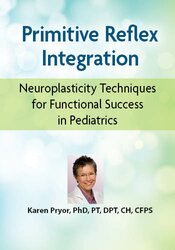

Many pediatric therapists face the frustrating reality of treating children whose progress is hindered by retained primitive reflexes. These reflexes, when not properly integrated, can impede the development of essential motor and cognitive skills, making it difficult to achieve desired outcomes in therapy.
In this workshop, Dr. Karen Pryor, an expert in pediatric neuroplasticity with over 40 years of experience, will guide you through the process of identifying when a retained reflex creates a functional impact and how to address it effectively. You’ll learn to:
Dr. Pryor’s extensive background in early intervention, combined with her innovative neuroplasticy techniques, will provide you with the tools to make informed decisions about when to intervene and how to do so effectively. This course will empower you to create individualized, client-centered treatment plans that lead to significant improvements in your patients’ functional outcomes, helping you elevate your clinical practice to the next level.
Planning Committee Disclosure - No relevant relationships
All members of the PESI, Inc. planning committee have provided disclosures of financial relationships with ineligible organizations and any relevant non-financial relationships prior to planning content for this activity. None of the committee members had relevant financial relationships with ineligible companies or other potentially biasing relationships to disclose to learners. For speaker disclosures, please see the faculty biography.
Continuing education credit information is coming soon for this non-interactive self-study package.
CEs may be available for select professions, as listed in the target audience. Hours will be dependent on the actual recording time. Please check with your state licensing board or organization for specific requirements.
There may be an additional fee for CE certificates. Please contact our Customer Service at 1-800-844-8260 for more details.
**Materials that are included in this course may include interventions and modalities that are beyond the authorized practice of your profession. As a licensed professional, you are responsible for reviewing the scope of practice, including activities that are defined in law as beyond the boundaries of practice in accordance with and in compliance with your professions standards.

Karen Pryor, PhD, PT, DPT, CH, CFPS, has a doctorate in physical therapy and has practiced for 40 years in the field. Dr. Pryor is the owner of Health Sphere Wellness Center, an integrative therapy clinic in Nashville, Tennessee. Involved with early intervention in the birth-three population for over 30 years, she has developed neuroplasticity techniques that are used in a wide variety of settings, including homes, childcare centers, and school systems, to advanced pediatric therapy programs.
Dr. Pryor serves on several boards, including the Leadership Interagency Council for Early Intervention (2014-2019), a position to which she was appointed by Tennessee Governor Bill Haslam. In 2010, she received the President's Volunteer Service Award for her contributions to the advanced treatment of children from President Barack Obama. In addition to her work with children, Dr. Pryor has served as an adjunct professor at the Tennessee State University Occupational Therapy Assistant program. She is a clinical instructor for several universities and colleges. With her years of experience and passion for complete wellness, Dr. Pryor advances a more expansive view of how to integrate therapy throughout the lifespan by using neuroplasticity techniques.
Speaker Disclosures:
Financial: Karen Pryor is the owner of Health Sphere Wellness Center, LLC and is a field examiner for PDMS-3. She has employment relationships with Tennessee State University, the University of Tennessee at Chattanooga Physical Therapy School, the Daymar Physical Therapy Assistant School and the Volunteer State Community College. She is a paid consultant for Evergreen Certifications. Karen Pryor receives a speaking honorarium and recording royalties from PESI, Inc. She has no relevant financial relationships with ineligible organizations.
Non-financial: Karen Pryor is a reviewer with Tennessee Physical Therapy Association and American Physical Therapy Association. She is an Ambassador for National Down Syndrome Society.
Access never expires for this product.
Visit our FAQ page at www.pesi.com/faq or contact us at www.pesi.com/info
Satisfaction Guarantee
Your satisfaction is our goal and our guarantee. Concerns should be addressed to: PO Box 1000, Eau Claire, WI 54702-1000 or call 1-800-844-8260.
ADA Needs
We would be happy to accommodate your ADA needs; please call our Customer Service Department for more information at 1-800-844-8260.
PESI Mobile App
Access CE trainings on your phone or tablet through our free mobile app. Choose video or audio-only versions of online courses from the world’s best instructors, and complete your CE requirements anywhere, anytime, at your own pace.
Please wait ...